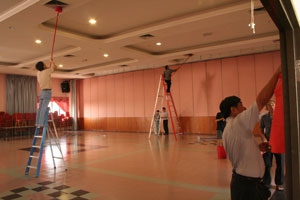Submitted by zhenliang on

One hundred and sixty-five people turned up on the morning of 1 st Februarty 2007 at Than Hsiang Temple for the annual Spring Cleaning. They were in jeans and T-shirts and armed with pails, mops, brooms and even a vacuum cleaner or two; definitely well prepared and eager to start cleaning the temple. At 8.30am, the whole group of staff, volunteers and devotees gathered at the Hall of Great Compassion to listen to the Abbot, Venerable Wei Wu, before the start of the Spring Cleaning.
“Today we are gathered here for what is called Spring Cleaning” said Venerable Wei Wu. “Spring Cleaning suggests that we are cleaning up the place in early spring at the beginning of the year. Actually it should be termed ‘year end cleaning'. It is more apropriate to call it Winter Cleaning. In an agricultural country like China, the four seasons are very distinct. Starting from Spring, Summer, Autumn, and Winter, the end of the lunar year is the winter month; the 12 th lunar month of the year. After this 12 th lunar month, the 1 st lunar month of the following year signals the beginning of a new year. What we commonly know as the Chinese New Year, is more commonly described as the ‘Spring Festival' in China and Taiwan. Thus, at the end of the lunar year, after having gone through three cold months of winter , everyone is eagerly looking forward to welcome the spring. Although, ‘Spring Cleaning' is looking forward to the new year, this is actually done during winter. In Chinese, it is called ‘year end cleaning'.”
“I like to share with you a story of the Buddha. Once Buddha was staying in a place with many of his disciples. At that time, the Buddha observed that the place was dirty and he himself took up a broom and started cleaning up the court yard. When the great disciples like Sariputa, Mogallana and Ananda saw this, they were very surprised because they felt that Buddha should not be doing something as lowly as sweeping the floor. So they all quickly pick up a broom and started sweeping the court yard too. Many of the disciples soon joined in and before long the court yard was very clean. After the cleaning was done, everyone gathered in one place and Buddha spoke to them. Smiling to the bhikkhus, the Buddha showed appreciation for everyone's involvement. He told the disciples there are five benefits for cleaning the environment:
1. The first benefit is when we do this, we are also cleaning up our own mind.
2. Secondly, when we do this, especially in a group, we are also helping others to clean their minds.
3. The third benefit is that when the devas or heavenly beings see that the place is very clean in this human realm, they also become very happy.
4. The fourth benefit is that when the external environment has been thoroughly cleaned, then our internal defilements are also swept away. It is like planting a seed for developing a clean mind. We should reflect that it is not the external environment alone that needs cleaning but we should clean up our internal defilements as well. What are our defilements? To express it in simple terms, we have the defilements of greed, anger and ignorance; so we sweep away these three poisons.
5. The final benefit related by the Buddha is that if we constantly clean up the environment and if whiles doing so we were to also contemplate on cleaning our own mind, then when our lives come to an end in this world, we will be born in a heavenly place.”
Venerable Wei Wu said this was translated from the scriptures of the Sarvastivada. With that, the Abbot exclaimed, “OK, let's get to work.”
Everyone needed no further urging than that and soon the whole temple was filled with the activity of people dusting, wiping, sweeping, vacuuming, mopping, brushing, scrubbing, and washing. A good many were seen quietly doing the cleaning. Were they also contemplating on cleaning their minds as well? If so, then Venerable Wei Wu's dharma talk in the morning had been received with upturn cups. Sadhu! Sadhu! Sadhu! to all.
In less than three hours, with the concerted efforts of all, the temple was spit and span again, ready for the start of a new year. Everyone gathered at the Hall of Great Compassion again to hear the Abbot speak. Venerable Wei Wu asked, “You were assigned or volunteered to go to one area for the clean up. Before cleaning up, was the place dirty enough? Was it very dirty?” This was answered with a resounding, “Yes!” Venerable Wei Wu asked again, “ After cleaning up, was the place very clean?” This time the “Yes” was not so loud, as befits a modest answer.
“Thank you very, very, very, very, very, very, very, very, very, very, very, very, very, very much,” said Shifu to much laughter.
“So, I'm going to ask you two more questions. In fact these two questions are more important than the two questions that have been asked. You might remember that when we started this morning, Shifu told you a story of the Buddha cleaning up the place, then later on, in a setting like this, Buddha talked about the five benefits of cleaning up the environment and also cleaning up our internal defilements. I like to ask you to reflect on this. In the first two questions, we talked about the environment. The third question is, ‘Before the big clean up this morning, were your mind dirty enough?'
I think you can guess the final question that I'm going to ask. Before this clean up exercise, you say, ‘My mind is defiled' or the mental defilements are very serious. What about during the process of cleaning up the temple, did you contemplate while cleaning up our environment as Shifu asked? Each and everyone of you now ask the question, ‘Is my mind clean enough now?'
I think the answer is ‘No'. However, we don't have to be very harsh with ourselves. We can ask a kinder question. That is make a comparison of your mental defilements before and after the cleaning exercise. After we participated in this clean up, is my mind at least a little cleaner? If the answer is ‘Yes' then you have not wasted your time this morning. If the answer is ‘Yes', a big Sadhu to you.”
Everyone then adjoined for lunch with this message in mind and a T-shirt for their hard work. Will the process of cleaning up the mental defilements be ongoing throughout the year ahead? I think we need to make a firm New Year Resolution for this and strive to be mentally mindful in reducing our mental defilements. Amituofo.







